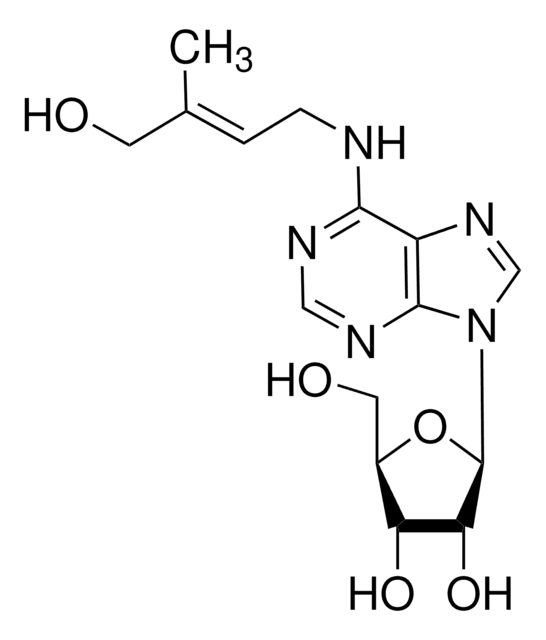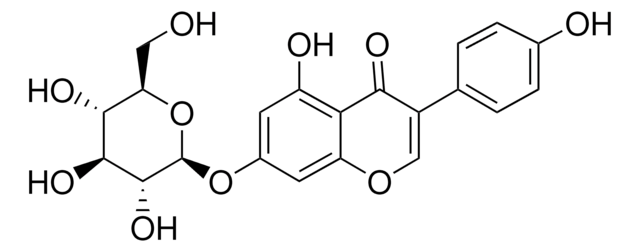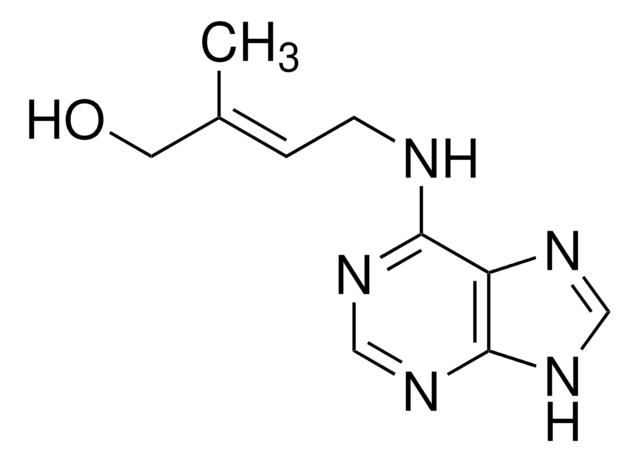SCP0174
KISS-1 58-65
Se connecterpour consulter vos tarifs contractuels et ceux de votre entreprise/organisme
About This Item
Formule empirique (notation de Hill):
C33H59N11O11
Poids moléculaire :
785.89
Code UNSPSC :
51111800
Nomenclature NACRES :
NA.32
Produits recommandés
Pureté
≥95% (HPLC)
Forme
lyophilized
Composition
Peptide Content, ≥75%
Conditions de stockage
protect from light
Température de stockage
−20°C
Amino Acid Sequence
Pro-Ala-Ala-Thr-Ala-Arg-Leu-Ser
Application
Kisspeptins are a family of peptides encoded by the KISS-1 gene that are involved in GPR54 mediated cell signaling. Kiss-1 gene products are involved in metastasis suppression and the regulation of gonadotropin-releasing hormone (GnRH) secretion. A variety of kisspeptin peptides are available for use to study their unique functions.
Code de la classe de stockage
11 - Combustible Solids
Classe de danger pour l'eau (WGK)
WGK 1
Point d'éclair (°F)
Not applicable
Point d'éclair (°C)
Not applicable
Certificats d'analyse (COA)
Recherchez un Certificats d'analyse (COA) en saisissant le numéro de lot du produit. Les numéros de lot figurent sur l'étiquette du produit après les mots "Lot" ou "Batch".
Déjà en possession de ce produit ?
Retrouvez la documentation relative aux produits que vous avez récemment achetés dans la Bibliothèque de documents.
E Papaoiconomou et al.
In vivo (Athens, Greece), 25(3), 343-354 (2011-05-18)
The Kiss-1 gene encodes a secreted protein that is proteolytically cleaved to produce a number of structurally related peptides, with high interspecies conservation, globally termed kisspeptins. The original niche for the role of kisspeptin in human physiology is derived from
Rafael Pineda et al.
Progress in brain research, 181, 55-77 (2010-05-19)
Reproductive maturation and function are maintained by a complex neurohormonal network that integrates at the so-called hypothalamic-pituitary-gonadal (HPG) axis. This system is hierarchically controlled by the decapeptide, GnRH, which in turn is under the dynamic regulation of multiple stimulatory and
Jenny Clarkson et al.
The Journal of neuroscience : the official journal of the Society for Neuroscience, 28(35), 8691-8697 (2008-08-30)
Kisspeptin and its receptor GPR54 have recently been identified as key signaling partners in the neural control of fertility in animal models and humans. The gonadotropin-releasing hormone (GnRH) neurons represent the final output neurons of the neural network controlling fertility
Naresh Kumar Hanchate et al.
The Journal of neuroscience : the official journal of the Society for Neuroscience, 32(3), 932-945 (2012-01-21)
Reproduction is controlled in the brain by a neural network that drives the secretion of gonadotropin-releasing hormone (GnRH). Various permissive homeostatic signals must be integrated to achieve ovulation in mammals. However, the neural events controlling the timely activation of GnRH
Notre équipe de scientifiques dispose d'une expérience dans tous les secteurs de la recherche, notamment en sciences de la vie, science des matériaux, synthèse chimique, chromatographie, analyse et dans de nombreux autres domaines..
Contacter notre Service technique






